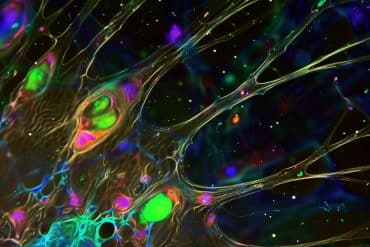Summary: The gender of a partner significantly affects women’s expectations and the likelihood of orgasm. By examining the “orgasm gap” between cisgender men and women, researchers uncovered that women anticipate more clitoral stimulation and have higher orgasm expectations with female partners than with male partners.
This difference in expectation influences the likelihood of women actively pursuing an orgasm, highlighting how dominant sexual scripts associated with partner gender can shape sexual experiences and satisfaction. These insights underscore the need for diversity in sexual acts and a shift in sexual scripts to bridge the orgasm gap and promote equality in sexual pleasure.
Key Facts:
- Women’s expectations for orgasm and clitoral stimulation are significantly higher when partnered with women compared to men, influencing their pursuit of orgasm.
- The study suggests that dominant sexual scripts, which differ based on partner gender, play a crucial role in perpetuating the orgasm gap by shaping expectations and behaviors.
- Addressing the orgasm gap involves changing sexual scripts and encouraging an environment that supports diverse sex acts and clitoral stimulation, regardless of partner gender.
Source: Society for Personality and Social Psychology
A new study published in Social Psychological and Personality Science investigated the factors influencing orgasm rates for women across sexual orientations.
The researchers report that partner gender plays a significant role in how women approach sex. and their likelihood of reaching orgasm.
Understanding the Orgasm Gap
Previous research has established the existence of an “orgasm gap,” where cisgender women are less likely to achieve orgasm during partnered sex compared to cisgender men. This new study delves deeper, investigating how a partner’s gender shapes women’s expectations and ultimately, their pursuit of orgasm.
Key Findings
The study found in two samples that:
- Women reported significantly higher expectations for clitoral stimulation and orgasm when expecting a female partner compared to a male partner. This suggests that women anticipate different sexual acts based on their partner’s gender.
- Partner gender had a significant indirect effect on women’s orgasm pursuit. This means that partner gender influenced women’s likelihood of pursuing orgasm through the mediating factors of clitoral stimulation and expectations for orgasm. In simpler terms, when women anticipated having sex with a female partner, they reported both higher expectations for clitoral stimulation and orgasm, which made them more likely to actively pursue orgasm themselves.
Implications and Next Steps
These findings suggest that dominant sexual scripts, which vary based on partner gender, may contribute to the orgasm gap by shaping women’s expectations and behaviors during sex.
Lead author Kate Dickman, a recent graduate of Rutgers University, emphasizes the practical implications: “If women, or men partnered with women, want to increase their own or their partners’ orgasm, they should create an environment that encourages orgasm pursuit through diverse sex acts, particularly those involving clitoral stimulation.”
Co-author Grace Wetzel, of Rutgers University, highlights the broader context: “This research contributes to understanding gender disparities and inequities. It also sheds light on why the orgasm gap exists—specifically, how different expectations for sex with men and women can explain these differences.”
Beyond the Orgasm Gap
Wetzel notes that the results could be interpreted to mean that sex with men is intrinsically worse than sex with women, but this is not necessarily the case.
“The problem is not inherent to men or to being heterosexual, but to the dominant sexual scripts associated with heterosexual sex. Sexual scripts are flexible and can be changed,” Wetzel explains.
While acknowledging the importance of addressing the orgasm gap, Dickman concludes: “This study is just one piece of a larger conversation about gender disparities. Orgasm is just one aspect of sexual satisfaction, and this research should not be misinterpreted as suggesting that orgasm is the sole measure of a fulfilling sexual experience.”
About this psychology and sexuality research news
Author: Stephen Waldron
Source: Society for Personality and Social Psychology
Contact: Stephen Waldron – Society for Personality and Social Psychology
Image: The image is credited to Neuroscience News
Original Research: Closed access.
“The Role of Partner Gender: How Sexual Expectations Shape the Pursuit of an Orgasm Goal for Heterosexual, Lesbian, and Bisexual Women” by Grace M. Wetzel et al. Social Psychological and Personality Science
Abstract
The Role of Partner Gender: How Sexual Expectations Shape the Pursuit of an Orgasm Goal for Heterosexual, Lesbian, and Bisexual Women
Previous research has established that gendered sexual scripts shape sexual behavior. This study seeks to expand prior work on orgasm disparities for women across sexual orientations by exploring the role of partner gender.
Across two studies, we examined how the gender of women’s sexual partners influenced their orgasm goal pursuit.
We compared lesbian and heterosexual women’s experience with their most recent partner in Study 1, and experimentally compared bisexual women partnered with a woman or a man in a hypothetical sexual encounter in Study 2.
In both studies, women reported higher clitoral stimulation and orgasm expectations when partnered with a woman compared to a man. Moreover, partner gender had a significant indirect effect on women’s orgasm goal pursuit through clitoral stimulation and expectations for orgasm.
These results suggest that sexual scripts associated with partner gender play a key role in the orgasm gap for women who have sex with men.







